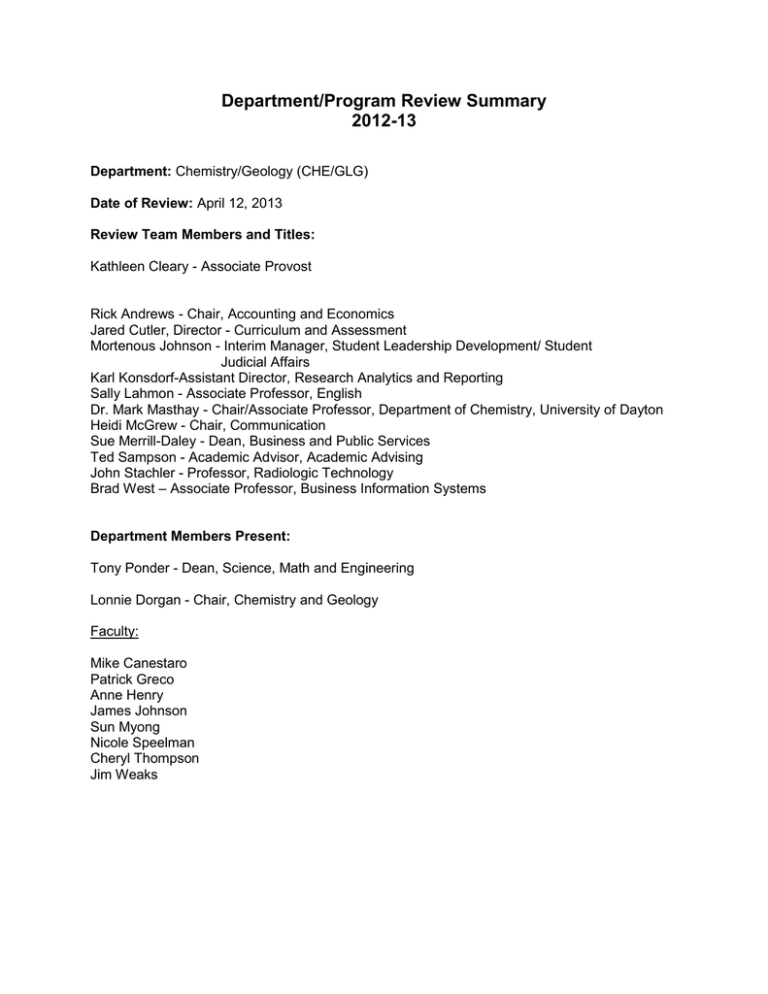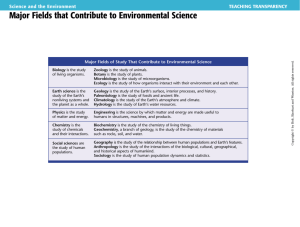Department/Program Review Summary 2012-13
advertisement

Department/Program Review Summary 2012-13 Department: Chemistry/Geology (CHE/GLG) Date of Review: April 12, 2013 Review Team Members and Titles: Kathleen Cleary - Associate Provost Rick Andrews - Chair, Accounting and Economics Jared Cutler, Director - Curriculum and Assessment Mortenous Johnson - Interim Manager, Student Leadership Development/ Student Judicial Affairs Karl Konsdorf-Assistant Director, Research Analytics and Reporting Sally Lahmon - Associate Professor, English Dr. Mark Masthay - Chair/Associate Professor, Department of Chemistry, University of Dayton Heidi McGrew - Chair, Communication Sue Merrill-Daley - Dean, Business and Public Services Ted Sampson - Academic Advisor, Academic Advising John Stachler - Professor, Radiologic Technology Brad West – Associate Professor, Business Information Systems Department Members Present: Tony Ponder - Dean, Science, Math and Engineering Lonnie Dorgan - Chair, Chemistry and Geology Faculty: Mike Canestaro Patrick Greco Anne Henry James Johnson Sun Myong Nicole Speelman Cheryl Thompson Jim Weaks Commendations: The review team felt that there was an excellent discussion on a variety of topics during the meeting with the department – it was an opportunity to explore many issues that hadn’t been developed in detail in the self-study submission. During the meeting with the review team the department evidenced a willingness to listen, an openness to new ideas, and there were many lively discussions during the meeting. The self-study was very reader-friendly, easy to follow, and free of jargon or terms that would be unfamiliar to someone outside of Chemistry or Geology. The department’s work with the nationally standardized Chemistry exam is extremely impressive – few if any community colleges use this, so results are benchmarked against four-year institutions, and the fact that the performance of Sinclair students on the exam are comparable to their peers at four year institutions is nothing short of remarkable. It was brave of the department to be willing to compare themselves to institutions with selective admissions, and makes the comparable level of performance all the more impressive. In addition, the pre/post methodology employed by the department allows for direct documentation of learning gains in the General Chemistry course. The department’s work in this area is highly commendable. When considering implementation of Developmental course prerequisites, the department based its decision on past data that provided an indication of the potential impact on success rates and enrollment, and determined that the evidence suggested that the increase in success rates would be negligible while a substantial number of students would be barred from the course with no apparent benefit in terms of increased success. The department made the decision not to implement the prerequisites based on these data. This is an excellent example of the use of data in decision making, one that other departments should follow. Another good example of the use of data was the revisions to the online versions of CHE 1111 and CHE 1311, which were motivated by lower success rates than the in-class sections. After the revisions, the success rates improved from roughly 50% to roughly 72%, a substantial increase and an excellent example of the use of data to monitor whether changes to course offerings are having an impact. It is encouraging to see the department recognizing a problem, taking steps to correct the problem, and then monitoring afterwards to see what impact the changes had, exemplifying Plan-Do-StudyAct. While the department has branched out into some online courses, it has also recognized the value of real-world lab experience, which is indicative of a thoughtful approach to how online learning can be applied to the program and what its limitations are. While online sections of CHE 1311 are an exception in that no on-campus lab work is done, for this course students purchase a lab kit that they use at home, which is a further indication that the department has been thoughtful about linking appropriate education experiences for each class and modality. During the meeting with the review team the Geology faculty in particular appeared to have read the review team comments prior to the meeting, and subsequently wove responses to those comments into the discussions during the meeting. They had obviously used this opportunity to reflect on perceptions from colleagues outside the department, and came prepared to have conversation that would be meaningful for them. Recommendations for Action: Repairs that are needed to Chemistry labs were mentioned during the meeting with the review team. The team was particularly concerned about ventilation repairs that were reported as being needed. Given the department’s commitment to safety, there is no doubt that the department is interested in seeking repairs as soon as possible, and while it may be too late to address these repair needs in the Capital Request process for this year, other sources of funding for these repairs should be explored with the division dean. During the meeting with the review team the department noted that students struggled due to inadequate math skills in introductory Chemistry courses. The department has done a nice job of identifying the problem, although in the subsequent discussion it was not clear whether there is certainty regarding exactly what is causing the problem. As noted in the commendations, the department has demonstrated skill in the past in using data to solve problems and make decisions, and the review team recommends that the department employ this skill to attempt to resolve this issue. The department is encouraged to explore ways to help students develop the math skills they need to succeed in Chemistry courses, and assess the impact of any measures they implement. There may be opportunities to employ online resources to bolster math skills, perhaps a collaborative effort with the math department could lead to the development of approaches that would help Chemistry students achieve higher levels of success by improving math skills. The Geology component of the department lacks visibility, and there is some indication that this may have impacted enrollment. The chair indicated that increasing visibility for Geology has been a concern since he took over leadership of the department, and it is recommended that the department move forward with efforts to once again incorporate Geology into the department name and prioritize other appropriate efforts to increase the visibility of the Geology segment of the department. It was noted that the program outcomes that the department is using are the ones that were used when Chemistry was merely an emphasis area under Liberal Arts and Sciences. Now that Chemistry is being treated as a stand-alone degree program, it would be appropriate to develop some program outcomes that are targeted for Chemistry. The existing outcomes may be kept if that is the department’s wish, but they should be supplemented by outcomes that distinguish Chemistry from other degree programs. It is recommended that the department work with the division learning liaison to develop effective and measurable outcomes. While the department could describe how students in their programs and courses encounter General Education outcomes, it does not appear that assessment of General Education outcomes is occurring. It is recommended that the department work with the division learning liaison to increase collection, analysis, and reporting of General Education assessment data, as well as data regarding program outcomes. By the next Program Review, the department should have several years of data on outcomes collected. It should be noted that assessment data need not be quantitative and need not necessarily be data that is presented in charts and tables. It is strongly recommended that the chair and/or other faculty members in the department participate in the Curriculum and Assessment track offered by the Center for Teaching and Learning to shore up departmental knowledge of assessment principles and practices. The recommendations from the previous Program Review were not addressed in the current self-study – the department should prioritize work on these recommendations from the last Program Review, as summarized below: Recommendations for Action: Develop evidence of student learning outcomes attainment and share the analyses with associated LHS departments to identify improvement targets Enlist the support of RAR to investigate the promise of prerequisites in courses where student success is compromised due to perceptions of inadequate academic background (in progress) Validate the department’s assertion there is a difference in student performance based on instruction by full-time versus part-time faculty through an RAR-supported study Conduct a needs analysis to identify part-time faculty development opportunities; deliver workshops and other training as appropriate Evaluate and pilot alternative modes of lecture/lab delivery through hybrid course formats and distance learning opportunities (off campus locations, too) as new models emerge o Benchmark other institutions and other departments on campus o Work with Distance Learning to identify current examples o Track students who transfer to obtain systematic feedback for the department’s use in refining curriculum and instruction Work with the Academic Staffing Coordinator to identify and implement a sustainable strategy to recruit part-time faculty members As experienced faculty members consider retirement, it is recommended that the department develop formal approaches for documenting their knowledge so that as much as possible is preserved before these faculty members transition out of the department. The Program Review is an opportunity to highlight department successes, innovations, and strengths – it was the sense of the review team that there are a number of impressive things the department is doing and a number of faculty achievements that were not communicated in the self-study. The department should utilize the Program Review and Annual Update processes to spotlight its strengths. Prior to future Annual Update and Program Review submissions, the department should engage in some deep reflection regarding successes that should be shared. The review team also felt that there could have been more reflection regarding opportunities for improvement in the department. While some challenges were mentioned, often solutions were not proposed or discussed in the self-study. The review team requests that the department conduct a more extensive Strengths/Weaknesses/Opportunities/Threats analysis and share it with the Provost’s Office within the next three months to ensure that the department is able to benefit from the self-assessment and thoughtful reflection that are one of the major benefits of the Program Review process and that should guide the development of the self-study. The self-study document isn’t really the end product of Program Review – the opportunity for departmental self-reflection and improvement is really what the process is designed to produce. Overall Assessment of Department’s Progress and Goals Without question this is a department that has some truly impressive initiatives underway. The experience and dedication of the faculty is beyond question. The department has shown a willingness to tackle difficult challenges in the interest of helping students learn, as evidenced by the development of online courses that retain a real-world lab component. The department’s work with its online courses also show that it has a capacity for identifying problems, implementing solutions, and tracking the success of those solutions, all of which were illustrated by the online CHE 1111/1131 redesign. The department has also demonstrated a commitment to data-driven decision making, as when data were used to make the decision regarding the proposed developmental prerequisites. Perhaps most impressive has been the decision to use the nationally standardized tests to compare Sinclair Chemistry students to their peers at fouryear institutions, with results that establish the high quality of faculty instruction and student learning in the department. Given some of the progress in the aforementioned areas, it would seem that faculty in the department have many of the skills that could be employed to strengthen assessment processes – compared to some departments, the learning curve may not be steep, and fewer steps may be needed to move the department toward a robust assessment plan. Faculty members in the department do some noteworthy things, and hopefully in future Annual Updates and Program Reviews the department will take the opportunity to bring these efforts the attention that they deserve. Institutional or Resource Barriers to the Department’s Ability to accomplish its Goals, if any: Since the recommendations from the previous Program Review were not addressed in the selfstudy, it may indicate that greater emphasis in this area is needed during Program Review orientation so that departments understand the importance of demonstrating that recommendations have been addressed since the most recent Program Review. Increased training may be appropriate in other aspects of the Program Review process as well, along with examples of exceptionally well-done self-studies that could be provided to departments. Online resources hold great promise in increasing learning – for example, increasing the math skills of Chemistry students might be accomplished in this manner. Often, however, the use of these online resources is cost-prohibitive. It may be that efforts at the institutional level to contract with book publishers and other companies that provide online content may allow the institution to procure more cost-effective deals that would benefit multiple departments. It may be that more guidance to departments on assessment may be required in some instances – perhaps departments should be reminded of the opportunity to use divisional learning liaisons to improve assessment efforts. Departments could perhaps be re-introduced to the General Education rubrics and there may be other opportunities to increase support to departments in their assessment work. Inclusion of faculty on review teams provides an excellent opportunity to learn more about the Program Review process and better prepare faculty to assist their departments in writing selfstudies – Sinclair may want to consider increasing the size of the review teams to give more faculty the opportunity to participate. Like many other departments, finding qualified adjunct faculty is a challenge for this department, one that may become greater due to the consequences of recent federal legislation.



